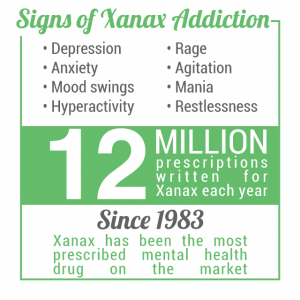Xanax Treatment & Benzos Rehab

Millions of people misuse and abuse prescription drugs each year, with a large portion of that amount being specifically benzodiazepines like Xanax and Valium. Becoming addicted to a drug like Xanax can happen easier than one might think, which is why it is important to recognize there are Xanax treatment and rehab options available for those who might be struggling with a benzo addiction. Keep reading to learn more about the various Xanax treatment and rehab programs available to find what might be a good option for you or someone you love struggling with a benzo addiction.
Xanax Use and Abuse:
Xanax is a brand name from the group of drugs known as benzodiazepines, aka “benzos.” They work through a series of properties including hypnotic effects, muscle relaxants and sedatives to help calm a person through anxiety or a panic attack. In some cases, Xanax is used to help those with alcohol addiction or insomnia, although its effectiveness has not been as studied in proven in those cases. By helping a person cope both physically and mentally through a panic attack, Xanax can be a valuable tool in helping the patient get back on track. However, Valium and other benzos should be used in conjunction with other treatment methods like talk therapy, learned coping skills and stress elimination. However, because the person’s body does build a tolerance to some drugs (including benzos like Xanax) it is important to recognize the drug can be easy to abuse, whether it is intentional or not.
Intentional misuse of benzos does happen as well. Taking the drug in excess amounts for a prolonged period of time, or along with other drugs like opioids, can be deadly. The sedative can work with an opioid to slow the breathing of the user to a dangerous level that can result in a fatal overdose. About 8 thousand people die each year as a result of fatal overdoses related to misuse or abuse of benzos. If you or someone you know is concerned about being addicted to Xanax or another benzo, it is important to recognize the warning signs of addiction and get help from a medical professional right away.
Xanax Addiction Signs and Treatment Options:
The biggest sign that a person is addicted to Xanax is an increased tolerance to the drug. By needing more and more pills each day in order to achieve the same physical effect on the body, the tolerance can quickly turn to addiction. Those who cannot function without the help of Xanax are showing signs of addiction. Inability to cope with anxiety and panic attacks without consuming copious amounts of Xanax can be not only a warning sign of addiction, but can result in many negative physical and mental consequences including stroke and death.
Fortunately there are many treatment options available for patients suffering from all types and levels of Xanax addiction. Some who may have recently begun showing signs of an addiction might have an easier road to recovery ahead of them. Those who may have struggled with addiction to other drugs as well as benzos may want to consider more serious and intensive treatment options.
The first treatment option a medical professional will consider is to wean you from the medication. This must be done under the direction of a doctor or at grave risk to the patient, could result in a variety of medical complications including severe side effects like insomnia, depression and excessive sweating.
If the patient is able to make it through the weaning stage without too much difficulty, they may be encouraged to consider talk therapy, drug addiction support groups or outpatient treatment, as well as consider other medications to treat anxiety to help get them on the road to recovery. However, a more serious addiction may require more serious treatment.
Xanax Rehab Options:
While there are a variety of treatment options available for those struggling with a prescription drug addiction, for those who have been abusing multiple prescription drugs, including benzos, it might be warranted to consider checking into a rehabilitation center. There are various types including both inpatient and outpatient, for those who are unable to completely go “off-grid” and into an actual rehab center for a period of time. Talking to your doctor about the severity of your addiction and your treatment options you might have already tried or explored, will help you determine if rehab is a good fit for you and your situation.
Inpatient Rehab:
Usually a person checks him or herself into a rehab facility for a specific period of time. It could be as short as 30 days, but can go longer depending on the person’s level of addiction and history of addiction. During inpatient treatment, the patient is monitored closely by doctors and support staff. Talk therapy, group therapy and alternative medications are likely to be used in treatment.
Outpatient Rehab:
Similarly, history of a person’s past addictions, other therapy options and other factors are considered when a person chooses outpatient therapy. It can be less intensive and might be a better option for those with a lesser addiction or someone who may have difficulty leaving a job or family for an extended period of time to receive treatment.
There are many options available to those who need help and support overcoming an addiction. It is important to talk to your doctor about what is the best treatment and/or rehab program for you.
Sources:
Medicalnewstoday.com
Drugs.com
Medlineplus.gov
teentreatmentcenter.com




